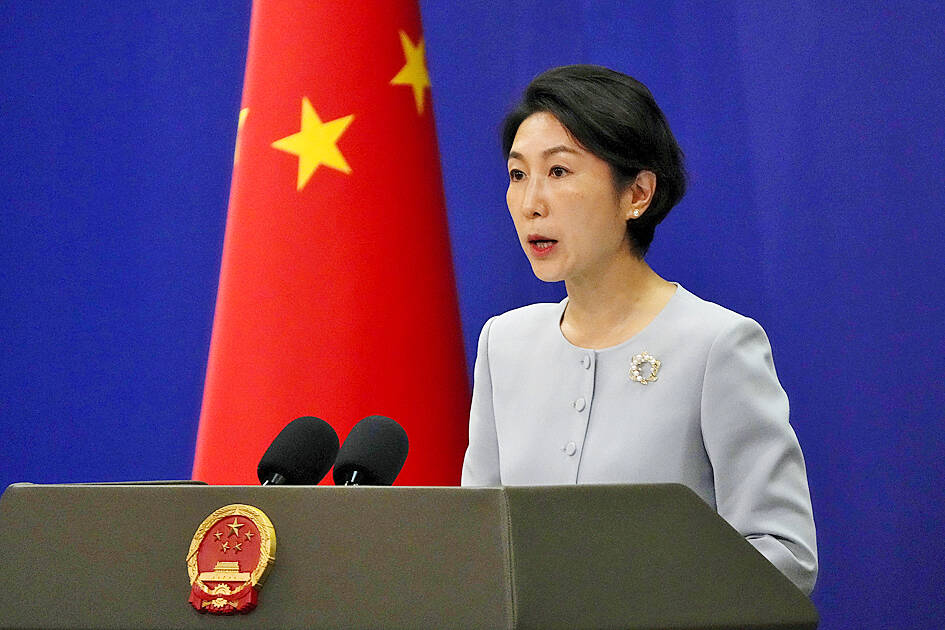New Zealand’s spy service yesterday branded China a “complex intelligence concern” and warned that the nation was vulnerable to foreign interference.
In an annual threat report, the New Zealand Security Intelligence Service said that several countries were undertaking “malicious activity” on its shores, but called out China’s attempts as “complex and deceptive.”
In particular, Beijing was accused of using front organizations to connect with local groups to replace authentic and diverse community views with those approved by the ruling party.

Photo: AP
In one example, a Chinese-language community news outlet parroted Beijing’s talking points, it said.
“These front organisations will often appear to be community-based ... but their true affiliation, direction and funding sources are hidden,” the report said.
The unusually blunt language comes as New Zealand’s recently elected center-right government tilts the nation’s foreign policy more closely toward traditional Western allies. This comes after years of growing economic ties with China — New Zealand’s biggest trade partner.
In March, Wellington publicly said that a Chinese state-sponsored group was behind a 2021 malicious cyberattack that infiltrated sensitive government computer systems.
Beijing dismissed allegations of hacking and accused New Zealand critics of being puppets of the US.
Asked about the spy report, Beijing yesterday said that it would “never interfere in the internal affairs of any other country.”
“We hope the New Zealand side will maintain a rational and objective understanding of China, and create favorable conditions for the development of healthy, stable relations between the two countries,” Chinese Ministry of Foreign Affairs spokeswoman Mao Ning (毛寧) said.
New Zealand’s spy agency said the country’s geographical position and role in the Pacific region made it “vulnerable” to other countries striving for greater influence.
That included Russia, which “likely monitors the public statements and social media accounts” of people, it said.
In another case, an unnamed country contacted a local New Zealand council and offered to pay for a community event if they agreed to restrict a particular religious group.
The report aimed to be upfront about threats facing the country, Security Intelligence Service Director-General Andrew Hampton said.
“The point is not to alarm anyone, but to alert New Zealanders to the threats so that we can work together to manage them,” he said.
Earlier this year, New Zealand Prime Minister Christopher Luxon said the country could no longer depend on the “splendid isolation” provided by its geography.
China remains New Zealand’s biggest trading partner — exporting dairy, meat and wood products that exceeded NZ$21.39 billion (US$13.2 billion), official data showed.
Luxon has warned that although China was “a country of undoubted influence,” different values mean “there are issues on which we cannot and will not agree.”

SECURITY: As China is ‘reshaping’ Hong Kong’s population, Taiwan must raise the eligibility threshold for applications from Hong Kongers, Chiu Chui-cheng said When Hong Kong and Macau citizens apply for residency in Taiwan, it would be under a new category that includes a “national security observation period,” Mainland Affairs Council (MAC) Minister Chiu Chui-cheng (邱垂正) said yesterday. President William Lai (賴清德) on March 13 announced 17 strategies to counter China’s aggression toward Taiwan, including incorporating national security considerations into the review process for residency applications from Hong Kong and Macau citizens. The situation in Hong Kong is constantly changing, Chiu said to media yesterday on the sidelines of the Taipei Technology Run hosted by the Taipei Neihu Technology Park Development Association. With

CARROT AND STICK: While unrelenting in its military threats, China attracted nearly 40,000 Taiwanese to over 400 business events last year Nearly 40,000 Taiwanese last year joined industry events in China, such as conferences and trade fairs, supported by the Chinese government, a study showed yesterday, as Beijing ramps up a charm offensive toward Taipei alongside military pressure. China has long taken a carrot-and-stick approach to Taiwan, threatening it with the prospect of military action while reaching out to those it believes are amenable to Beijing’s point of view. Taiwanese security officials are wary of what they see as Beijing’s influence campaigns to sway public opinion after Taipei and Beijing gradually resumed travel links halted by the COVID-19 pandemic, but the scale of

A US Marine Corps regiment equipped with Naval Strike Missiles (NSM) is set to participate in the upcoming Balikatan 25 exercise in the Luzon Strait, marking the system’s first-ever deployment in the Philippines. US and Philippine officials have separately confirmed that the Navy Marine Expeditionary Ship Interdiction System (NMESIS) — the mobile launch platform for the Naval Strike Missile — would take part in the joint exercise. The missiles are being deployed to “a strategic first island chain chokepoint” in the waters between Taiwan proper and the Philippines, US-based Naval News reported. “The Luzon Strait and Bashi Channel represent a critical access

Pope Francis is be laid to rest on Saturday after lying in state for three days in St Peter’s Basilica, where the faithful are expected to flock to pay their respects to history’s first Latin American pontiff. The cardinals met yesterday in the Vatican’s synod hall to chart the next steps before a conclave begins to choose Francis’ successor, as condolences poured in from around the world. According to current norms, the conclave must begin between May 5 and 10. The cardinals set the funeral for Saturday at 10am in St Peter’s Square, to be celebrated by the dean of the College